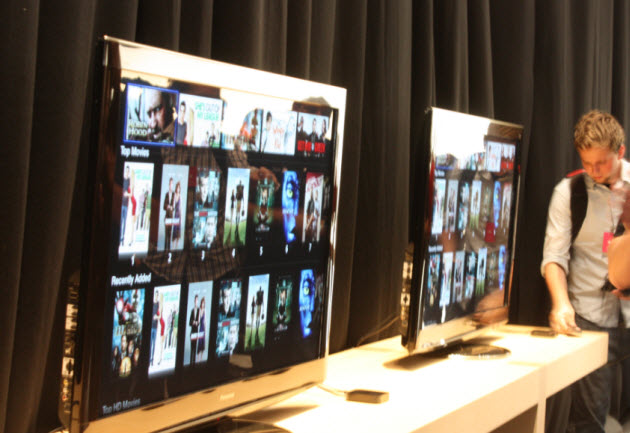 Now that it has relaunched Apple TV, the next step in Apple’s living room strategy is the launch of an Apple-branded TV.
Now that it has relaunched Apple TV, the next step in Apple’s living room strategy is the launch of an Apple-branded TV.
Some wags expected Apple do so yesterday at its event where it launched the new $99 Apple TV. After all, Steve Jobs, chief executive of Apple, indicated that something like that would have to happen when he was interviewed by Walt Mossberg and Kara Swsher at the D conference in July. In that interview, Jobs shot down the notion that a stand-alone set-top box such as Apple TV, which he had called a “hobby” in the past, could succeed without being part of a TV.
 “The problem with innovation in the TV industry is the go-to-market strategy,” Jobs said (video here). “The TV industry has a subsidized model that gives everyone a set-top box for free. So no one wants to buy a box. Ask TiVo, ask Roku, ask us … ask Google in a few months. The television industry fundamentally has a subsidized business model that gives everyone a set-top box, and that pretty much undermines innovation in the sector. The only way this is going to change is if you start from scratch, tear up the box, redesign and get it to the consumer in a way that they want to buy it. But right now, there’s no way to do that. … The TV is going to lose until there’s a viable go-to-market strategy. That’s the fundamental problem with the industry. It’s not a problem with the technology, it’s a problem with the go-to-market strategy. … I’m sure smarter people than us will figure this out, but that’s why we say Apple TV is a hobby.”
“The problem with innovation in the TV industry is the go-to-market strategy,” Jobs said (video here). “The TV industry has a subsidized model that gives everyone a set-top box for free. So no one wants to buy a box. Ask TiVo, ask Roku, ask us … ask Google in a few months. The television industry fundamentally has a subsidized business model that gives everyone a set-top box, and that pretty much undermines innovation in the sector. The only way this is going to change is if you start from scratch, tear up the box, redesign and get it to the consumer in a way that they want to buy it. But right now, there’s no way to do that. … The TV is going to lose until there’s a viable go-to-market strategy. That’s the fundamental problem with the industry. It’s not a problem with the technology, it’s a problem with the go-to-market strategy. … I’m sure smarter people than us will figure this out, but that’s why we say Apple TV is a hobby.”
Apple watchers were not only disappointed at the lack of an Apple-branded TV. They also wanted Apple TV to go farther by making apps available on the TV screen. Gene Munster, analyst at Piper Jaffray, believes that Apple will enter the TV market by 2011 with an Apple branded set, digital video recording, and home media functions built into it. As evidence, Munster noted that Apple chief operating officer Tim Cook said last month that Apple continues to invest in Apple TV. Also, Apple signed a five-year, $500 million partnership with LG to produce LCD screens. An Apple TV set could wirelessly sync with iPods, iPhones and Macs. And the touchscreens on iPhones, iPod Touch devices, and iPads could be used as remote controls or game controllers.
Prices have fallen dramatically in the TV market. But Apple could probably command a premium if it built Apple TV into an actual TV set. (The electronics cost to do that would be pretty small). And I’m sure that Apple would much rather sell a TV for $500 or $1,000 instead of a $99 Apple TV box. And once you’re built into a TV, no one is going to knock you out of the living room with a slightly better box.
Big computer companies have tried to go into the TV business before. Hewlett-Packard and Dell have failed at it. But Apple has a brand cachet that they don’t. It is more on par with Sony in that respect. Randy Lawson, an analyst at market resaercher iSuppli, is skeptical Apple will make its own branded TVs. He thinks that companies that have tried to create premium TV brands, such as Pioneer, have completely failed because of the cutthroat nature of the market.
“The margins are tight in this business,” Lawson said. “Apple has surprised everyone in the past several years. I’m not saying they will never do it. But it’s not their style to offer lots of low-cost models in a fast-changing market.”
VentureBeat's mission is to be a digital town square for technical decision-makers to gain knowledge about transformative enterprise technology and transact. Learn More
